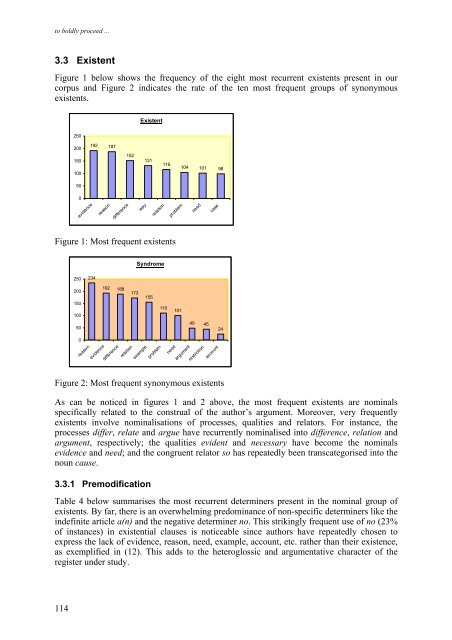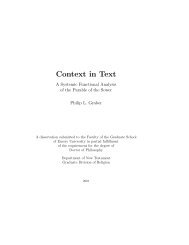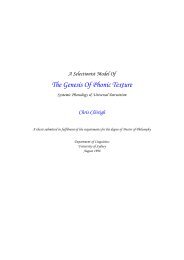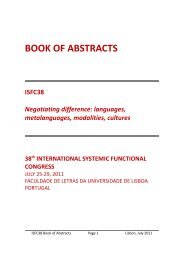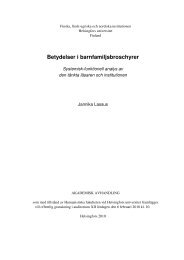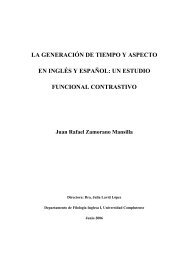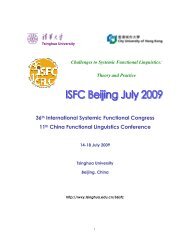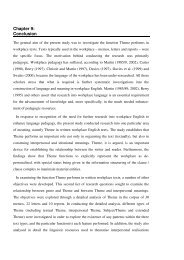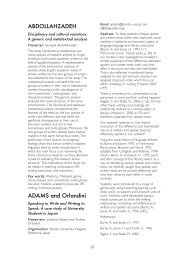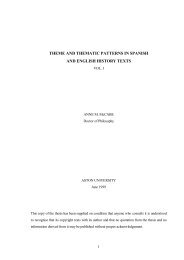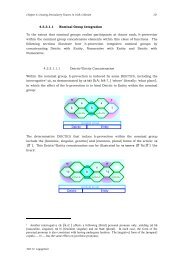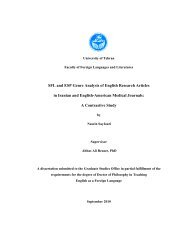- Page 1 and 2:
Papers from the 39th ISFCTo boldly
- Page 3 and 4:
Papers from the 39th ISFCto boldly
- Page 5 and 6:
To boldly proceed:Papers fromthe 39
- Page 7 and 8:
Papers from the 39th ISFCLanguages
- Page 9 and 10:
Papers from the 39th ISFCMotoki Sa
- Page 11 and 12:
Papers from the 39th ISFCList of Re
- Page 13 and 14:
Papers
- Page 16:
to boldly proceed ...represents a c
- Page 20 and 21:
to boldly proceed ...themselves as
- Page 22 and 23:
to boldly proceed ...choose seconda
- Page 24 and 25:
to boldly proceed ...3 Where’s th
- Page 26 and 27:
to boldly proceed ...The result is
- Page 28 and 29:
to boldly proceed ...been able to s
- Page 30 and 31:
to boldly proceed ...It is importan
- Page 32 and 33:
to boldly proceed ...6. ConclusionT
- Page 34 and 35:
to boldly proceed ...consciously fo
- Page 36 and 37:
to boldly proceed ...The basic idea
- Page 38 and 39:
to boldly proceed ...number of reas
- Page 40 and 41:
to boldly proceed ...In discussing
- Page 42 and 43:
to boldly proceed ...not all with p
- Page 44 and 45:
to boldly proceed ...Deng, X. P. (1
- Page 46 and 47:
to boldly proceed ...cohort, with a
- Page 48 and 49:
to boldly proceed ...AssessmentsCol
- Page 50 and 51:
to boldly proceed ...and their ment
- Page 52 and 53:
to boldly proceed ...A number of st
- Page 54 and 55:
to boldly proceed ...4 Findings and
- Page 56 and 57:
to boldly proceed ...teachers shoul
- Page 58 and 59:
to boldly proceed ...adopted in the
- Page 60 and 61:
to boldly proceed ...As shown in Ta
- Page 62 and 63:
to boldly proceed ...information fl
- Page 64 and 65:
to boldly proceed ...2.2 Two expres
- Page 66 and 67:
to boldly proceed ...3.2. 2 At lexi
- Page 68 and 69:
to boldly proceed ...ReferencesByrn
- Page 70 and 71:
to boldly proceed ...2. Theoretical
- Page 72 and 73:
to boldly proceed ...FIGHT FOR THE
- Page 74 and 75:
to boldly proceed ...Derewianka,B.
- Page 76 and 77: to boldly proceed ...2 The Knowledg
- Page 78 and 79: to boldly proceed ...mood in which
- Page 80 and 81: to boldly proceed ...Debbie’s use
- Page 82 and 83: to boldly proceed ...by speakers an
- Page 84 and 85: to boldly proceed ...4.1 ResultsMon
- Page 86 and 87: to boldly proceed ...account of how
- Page 88 and 89: to boldly proceed ...Genre-related
- Page 90 and 91: to boldly proceed ...4.2 Presentati
- Page 92 and 93: to boldly proceed ...such training
- Page 94 and 95: to boldly proceed ...1.1 The resear
- Page 96 and 97: to boldly proceed ...LanguagetoWhol
- Page 98 and 99: to boldly proceed ...identified in
- Page 100 and 101: to boldly proceed ...A shift from a
- Page 102 and 103: to boldly proceed ...Having determi
- Page 104 and 105: to boldly proceed ...memorisation,
- Page 106 and 107: to boldly proceed ...In translation
- Page 108 and 109: to boldly proceed ...The content of
- Page 110 and 111: to boldly proceed ...ReferencesBake
- Page 112 and 113: to boldly proceed ...across China,
- Page 114 and 115: to boldly proceed ...elaborationext
- Page 116 and 117: to boldly proceed ...Embeddedclause
- Page 118 and 119: to boldly proceed ...2 Ergativity i
- Page 120 and 121: to boldly proceed ...3.3 CauseThe c
- Page 122 and 123: to boldly proceed ...ReferencesCaff
- Page 124 and 125: to boldly proceed ...2 MethodologyA
- Page 128 and 129: to boldly proceed ...(17) the autho
- Page 130 and 131: to boldly proceed ...occurs in same
- Page 132 and 133: to boldly proceed ...3.2.1.2. Hypot
- Page 134 and 135: to boldly proceed ...Emotive and de
- Page 136 and 137: to boldly proceed ...The Young’s
- Page 138 and 139: to boldly proceed ...If the extract
- Page 140 and 141: to boldly proceed ...ReferencesBern
- Page 142 and 143: to boldly proceed ...restricts her
- Page 144 and 145: to boldly proceed ...A very product
- Page 146 and 147: to boldly proceed ...A salient aspe
- Page 148 and 149: to boldly proceed ...2 Twitter as a
- Page 150 and 151: to boldly proceed ...pattern, which
- Page 152 and 153: to boldly proceed ...analysis of co
- Page 154 and 155: to boldly proceed ...pertained to A
- Page 156 and 157: to boldly proceed ...Figure 1 Hasan
- Page 158 and 159: to boldly proceed ...for instance,
- Page 160 and 161: to boldly proceed ...branding, howe
- Page 162 and 163: to boldly proceed ...they could hav
- Page 164 and 165: to boldly proceed ...ReferencesAlle
- Page 166 and 167: to boldly proceed ...we will look a
- Page 168 and 169: to boldly proceed ...3.1.1 …but S
- Page 170 and 171: to boldly proceed ...cultural inher
- Page 172 and 173: to boldly proceed ...as the center
- Page 174 and 175: to boldly proceed ...According to E
- Page 176 and 177:
to boldly proceed ...photos and the
- Page 178 and 179:
to boldly proceed ...argued that al
- Page 180 and 181:
to boldly proceed ...that lines and
- Page 182 and 183:
to boldly proceed ...ReferencesBate
- Page 184 and 185:
to boldly proceed ...this framework
- Page 186 and 187:
to boldly proceed ...verbal, non-ve
- Page 188 and 189:
to boldly proceed ...Halliday and H
- Page 190 and 191:
to boldly proceed ...2.1.1 SystemGi
- Page 192 and 193:
to boldly proceed ...(A\x\H). Dialo
- Page 194 and 195:
to boldly proceed ...control traffi
- Page 196:
to boldly proceed ...identification
- Page 199 and 200:
Papers from the 39th ISFCdegree of
- Page 201 and 202:
Papers from the 39th ISFCCommitting
- Page 203 and 204:
Papers from the 39th ISFC2.1 Instan
- Page 205 and 206:
Papers from the 39th ISFCReferences
- Page 207 and 208:
Papers from the 39th ISFCGoing beyo
- Page 209 and 210:
Papers from the 39th ISFCif psychol
- Page 211 and 212:
Papers from the 39th ISFC4 Conclusi
- Page 213:
The 39th International Systemic Fun


